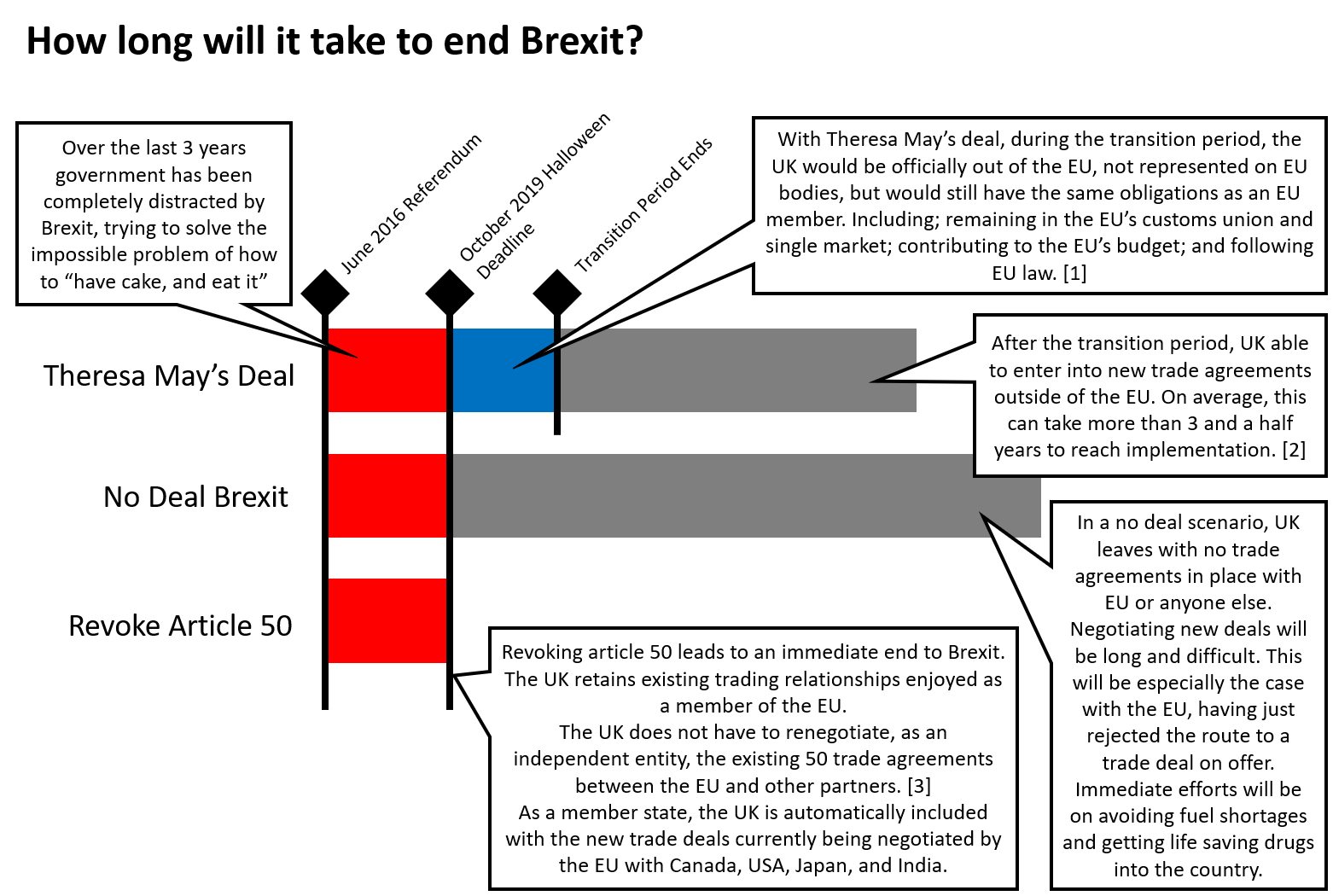This post goes into the numbers behind the current parliamentary arithmetic, and why Jeremy Corbyn is unable to lead a government of National Unity. (As of the 8th of October 2019).
Context
Parliament, and the majority of the population, are opposed to a no deal Brexit.
Boris Johnson, our current Prime Minister, unelected and with no popular mandate, has stated repeatedly that he will crash the UK out of the European Union with no deal if the EU doesn’t accept his terms for the UK leaving the European Union.
Many people have found it strange then, that Parliament, the elected representatives of the people, has yet to organise itself to throw out Boris Johnson as prime minister, in order to request a negotiating extension such that a general election can be held.
While a general election might hit produce a majority for any specific option, it will at least produce a prime minister with a legitimate mandate to negotiate with the EU.
Government Of National Unity
The idea of a Government of National Unity is that Parliament agrees to vote out the current prime minister, install a temporary leader and dissolve itself in order to hold new elections. In this instance, the Government of National Unity would also need to negotiate a Brexit extension with the European Union so that there is enough time to hold fresh elections without the UK crashing out of the European Union.
The biggest stumbling block to this action, is finding agreement from enough Members of Parliament to support the vote of no confidence in the existing government and Prime Minister.
Taken individually, there is a majority in Parliament against no deal. But as a group, things are not so clear.
Main problem being that Labour are currently insisting that Jeremy Corbyn should be the temporary Prime Minister to take over from Boris Johnson. Conservative MPs would be needed to support the Government of National Unity, and the Conservatives don’t trust, and won’t vote for, Jeremy Corbyn.
Hence it comes down to Parliamentary arithmetic - how many MPs are in each group?
I’m writing this post In response to the repeated false claims by labour that the Lib Dems are responsible for this mess. As you will see below, it is not the fault of the Lib Dem’s that the majority of MPs won’t support Jeremy Corbyn.
The Parliamentary Arithmetic
So- we’re trying to find a majority of MPs to support a Government of National Unity (GNU).
The Liberal Democrats:
Led by Jo Swinson, have stated that they will support a Government of National Unity, but won’t support Jeremy Corbyn unless it’s clear that he could win a majority in the house. The Lib Dems currently favour a neutral MP stepping forward to act as temporary prime minister who would be able to lead a Government of National Unity. Lib Dems = 19 votes.
Those who will vote against a Jeremy Corbyn Government of National Unity:
It’s likely that the current Conservative party will vote against a GNU without exception = 287 votes
The DUP have indicated that they will vote against a GNU = 10 votes.
Led by Anna Soubry, including Chris Leslie and Mike Gapes, The Independent Group for Change have been very clear that Jeremy Corbyn is unacceptable to them = 5 votes.
2 independent MPs, John Woodcock and Gavin Shucker, both are ex labour and both hugely strong critics of Jeremy Corbyn = 2 votes.
Charlie Elphicke, conservative MP for Dover (currently a suspended over sexual assault allegations but in practice follows the tory whip) = 1 vote.
Frank Field, quit the labour party over anti-semitism claims also has voted with the government on brexit = 1 vote.
Ivan Lewis, suspended from the labour party over sexual harrasment allegations but since quit over antisemitism claims and issues about Jeremy Corybn = 1 vote.
Ian Austin, quit the Labour party over Jeremy Corbyn and anti semitism. Used his speech in the emergency debate to criticise Jeremy Corbyn = 1 vote.
Sylvia Hermon, Independent in Northern Ireland, has been consistently clear she will “never vote for a government lead by Jeremy Corbyn” = 1 vote.
Kate Hoey and John Mann from the labour party who have consistently supported a hard Brexit and would very likely vote against = 2 votes.
Stephen Lloyd, ex lib dem MP who quit the party to vote for brexit = 1 vote.
Total = 312 against.
MPs who will abstain:
Sinn Fein who abstain from Parliament = 7 abstentions.
1 Speaker and 3 deputy speakers don’t vote (usually) = 4 abstentions.
Jared O'Mare, labour MP suspended over sexual harassment allegations and hasn't voted in parliament for nearly a year = 1 abstention.
Mike Hill, ex labour MP suspended over sexual harassment allegations, represents a strong leave constituency but has been highly critical of Jeremy Corbyn = 1 abstention.
The 23 tory ‘rebels’ who have mostly had the whip removed for voting to block no deal (or subsequently left due to falling out with Boris, like Anne Milton). May vote with the conservatives against, but certainly wouldn’t vote for Jeremy Corbyn = 23 abstentions.
Kelvin Hopkins, ex labour MP suspended over sexual harassment allegations, strongly pro brexit but strongly pro Jeremy Corbyn = 1 abstention.
Total = 37 abstentions
Those who will vote for a Jeremy Corbyn Government of National Unity:
Labour MPs, minus those mentioned above and ignoring any Brexit driven defections = 242 votes
The SNP have stated that they will vote in favour = 35 votes
Plaid Cymrae have stated that they will vote in favour = 4 votes
Green Party have stated that they will vote in favour = 1 vote
Chris Williamson, independent supporter of Jeremy Corbyn and against no deal = 1 vote.
Total = 283
Totals
A vote for a Jeremy Corbyn Government of National Unity currently loses by 28 votes.
With support from the Lib Dems this would still lose by 9 votes.
it is clear that, for a Government of National Unity to form and successfully form prevent a no deal Brexit, a neutral MP will need to step forward to be a caretaker Prime Minister.


